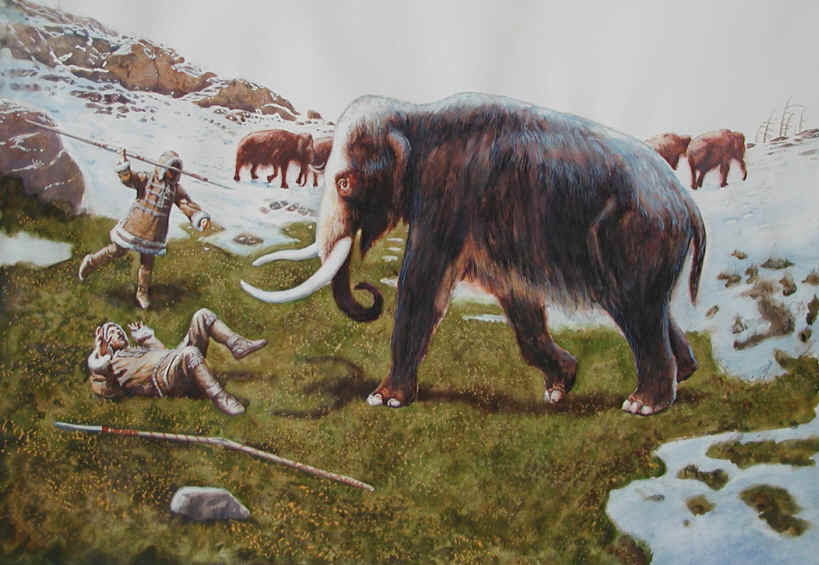As many others have noted, the descendants of the first hunter-gatherers that became agriculturalists wrote the founding document of the Judeo-Christian tradition.
I’m referring of course to Genesis: “God said…be fruitful, and multiply, and replenish the earth, and subdue it; and have dominion over every living thing that moveth upon the earth.”
People all over the world now realize that man’s “dominion over every living thing that moveth upon the earth” has run amuck, starting, in this age of globalization, the Sixth Extinction and bringing the health of the Earth’s overall ecosystem into peril.
However did the separation from and war upon nature begin here, with the transition, after tens of thousands of years of a nomadic, hunting-gathering way of life to the agricultural, settled way of life?
Prominent paleoanthropologists maintain, “The careless hunting of prey species [such as the megafauna that people found in North America when they migrated here thousands of years ago], based as it may have been on the extraordinary human capacity, does not equate with any conscious attempt to change the environment.”
Is that true, or does the difference between human hunters driving mammoths, giant sloths and even saber toothed tigers to extinction, and the increasing rapaciousness of man since the Agricultural Revolution, amount to a distinction without a difference where man is concerned?

Just what is the “extraordinary human capacity” anthropologists refer to?
It is our cognitive ability to separate, store, generate knowledge and manipulate our environments, rather than be defined by them, as all other animals do.
This capability is universal, and defines “the human adaptive pattern,” which no other animal possesses.
So what is the basic flaw in ‘human nature,’ and can we radically change it? It is the universal tendency to take that which we separate to be actually separate, and therefore feel separate from nature.
And by believing thought’s separations are more than just a functional capability, we are fragmenting the Earth all to hell. This deep, existential mistake, as old as man, also still divides us from each other — ethnically, religiously and nationally.
Hunter-gatherers had the same tendency, but because they lived close to nature, they were reminded on a daily basis that they weren’t actually separate from nature. All bets were off once the Agricultural Revolution took hold however.
Therefore the human existential crisis is much deeper and older than crops and cities. It’s just come to a head in our troubled age.
Our false separation from nature was set in motion by the evolution and emergence of symbolic thought, so-called ‘higher thought,’ about 100,000 years ago.
Therefore what needs to radically change is the domination of thought in the human brain, since thought is inherently and inescapably separative, and unchecked, has become unsustainably divisive and fragmentizing.
Rulers change, but without changing the ruling principle within us, new people will simply repeat the same old patterns of greed and domination.
Blamers of the Agricultural Revolution, the Industrial Revolution, or capitalism say things like, “Of course, humans being what they are, excessively intensive use of resources has almost inevitably resulted. Civilizations have risen and fallen on this cycle of overintensification…”
“Humans being what they are” refers to human nature, and human nature preceded the Agricultural Revolution by tens of thousands of years.
What needs to radically change in our age, if the globalization of division and fragmentation of nature is not to denude the Earth and destroy humanity, is a psychological revolution such that separative, symbolic thought no longer dominates the human brain. But what will replace it?
Rather than symbol and memory, self and others, and us vs. them, can the brain’s ‘default mode’ be in attention and stillness?
It can, but even adept meditators return to psychological memory and self after a meditative state. Is illumination when the brain can no longer revert and return to psychological thought? Perhaps in a fully illumined human being thought becomes merely a function – driving a car, building a house, planting a garden, designing and programming a computer, etc.
A conscious transmutation is required if humankind is to survive and thrive. That means ‘enlightenment’ is both available to us every moment (the universe being suffused with awareness), and requiring a breakthrough in the brain that comes with much spadework, questioning and diligent observation.

The key to quieting thought is to passively watch the movement of the mind in the mirror of nature until it effortlessly slows, and awareness grows quicker than thought. Then, as attention gathers, the whole brain watches every thought and emotion as they arise, without judgment or choice.
It’s like watching a roiling, muddy stream filled with debris go by, and in the very act of undividedly watching, the stream clears and quiets. At that moment the brain is no longer dominated by thought.
One cannot seek that state, only experiment and play with observation. Ending the domination of thought in the brain is an art, and people can only learn it within themselves.
Martin LeFevre

